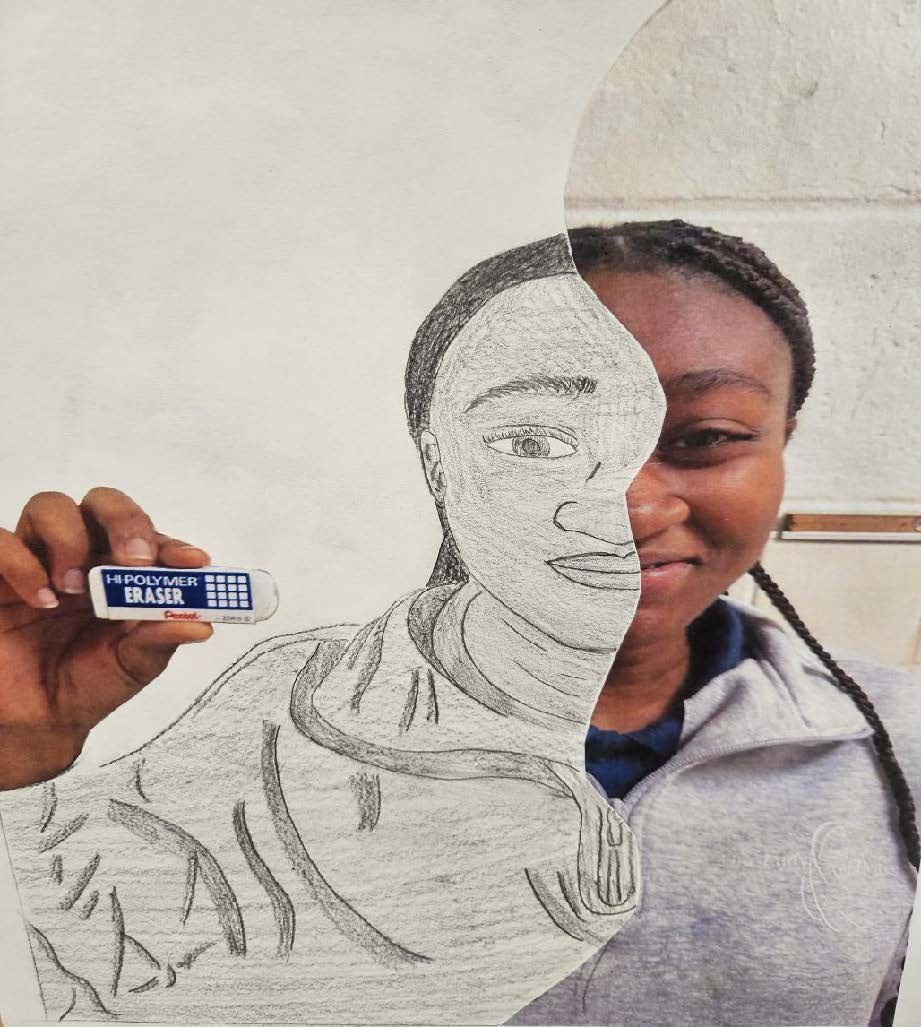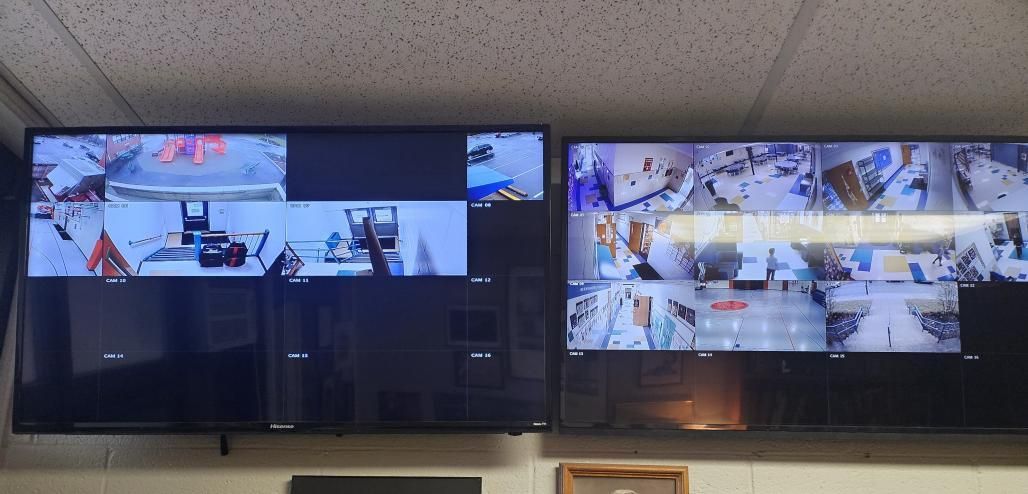8/25/23 - Friday Forget-Me-Nots by Jim Silcott
Photo Caption: Mrs. Magee with her fifth-grade students in the new fifth grade classroom.

Dear Our Lady of Peace Family,
As you may know, I have been adding the duty of being a teacher of Latin in addition to my principal’s role. For a lot of people, the teaching of Latin is considered “old school.” After all, isn’t Latin a dead language? For me, my life has been intertwined with this dead language for many, many years, and I find it extremely useful.
As someone born in the nineteen fifties, my first introduction to Latin was at Mass. When I started to train to be an altar boy (there were no altar girls back then), we began the arduous task of learning the prayers of the Mass in Latin, especially “The Confiteor” which was said shortly after the service began. The priest would have his back to the congregation and we servers would be on the ground on either side of him with our faces practically touching the floor, our cassock-covered bums the most prominent part of our bodies that people could see.
Right in the middle of my serving lessons, the effects of Vatican II came rushing into the Church, and by the time I was a certified server, the Mass was in English. Latin, for the most part, went the way of nickel sodas and the Baltimore Catechism.
Arriving at St. Charles in the fall of 1970, Latin was reintroduced to me on the very first day of school, in Room 301 by Father (now Monsignor) Bill Dunn, who taught Latin I to freshmen. Father Dunn taught with a low monotone voice that seemed to fit the Latin drills that were the beginning of our immersion into the language. “O or m, s, t, mus, tis, nt.” I can still hear him urging us on like monks in the monastery.
Even when he cracked a joke or corrected a student it sounded like a Latin drill, as his voice would lower and he would peer atop his glasses and say, “Eyes on the page, Mr. Silcott, not out the window. We are reciting Latin, not bird watching.” The first word we learned in Latin was agricola, first declension, masculine, meaning “farmer.” In order to keep up with Latin at St. Charles you had to attend to it daily, as regular as brushing your teeth, or you would fall behind quickly. Memorization, pop quizzes, endless translating from Latin to English and English to Latin all were part of my education. Although my baseball team at the time, the Baltimore Orioles, was in the World Series in 1970 (and beat the Reds in 5 games, under the mighty defense of Brooks Robinson), I had little time to attend to baseball games as my Latin homework was with me always.
St. Charles, at the time, only required you to sit through two years of Latin class, but I elected to ride out my high school career with four years, all with Father Dunn in Room 301. From Agricola vocat puellam through the Gallic wars of Julius Caesar — Veni, Vidi, Vici — to the musings of Cicero, I learned to parse long Latin passages, sometimes on my own, sometimes with the help of a superior Latin student, Jim Vonau, and many times with the aid of a pony, which was the name of English translations of Latin verse, illegal at St. Charles but widely utilized. When I graduated in 1974, I thought I was done with Latin but found quickly that Latin was not done with me.
In college, I continued to find myself doing Latin, this time as a tutor. Many a bright student starts out with hopeful ambition at St. Charles and finds himself doing well, except for his Latin. And so the phone calls began; from my parents’ friends, from neighbors, from a cousin of an ex-girlfriend. “You took Latin. Can you help?” I went to homes and drilled them just as Father Dunn had taught me, trying most of all to convince them that Latin was a discipline, much like exercise. Do it daily, do it often and you will succeed. Pick it up occasionally and you will fail.
When I was hired at Bishop Watterson in the fall of 1979, it was to teach English. Two days before the beginning of the school year in 1980, John Durant, the principal, came to me at the opening faculty meeting and said, “You went to St. Charles. You are going to be my new first year Latin teacher.” It seems that one of the Dominican sisters who taught Latin had retired suddenly when her driving privileges were taken away. And so, for 8 years I taught, along with my English classes, two sections of Latin I, handing my students off, if they made it that far, to Sister Francis Marie, who taught the upper Latin sections. The drills of syntax and translation that I had learned myself I tried my best to pass onto my students. Even today, I occasionally run into a former Latin student who doesn’t begin his conversation with hello but by citing the six cases of puella or the three persons, singular and plural, of amo.
When you teach something, you grow to love it and that is what happened with Latin and me. When I started my career as a principal at St. Timothy, I offered Latin to my students. When my oldest daughter was in middle school, I taught Latin to about 75 students from elementary schools, all over the north side, on Sunday evenings in the Our Lady of Peace cafeteria. This year, I will have 35 students in the middle school being introduced to, or continuing their learning of Latin.
Unlike life, Latin is orderly and organized. While the textbooks have changed, the language has not. There are still six cases of Latin nouns and the only controversy in Latin is whether to use classical or church pronunciation. When I look at the complexity of a sentence in English, I use Latin grammar to analyze it. When I see an unfamiliar word in a book I am reading, I frequently can guess its meaning because of its connection to its Latin roots. And as Latin has crept back into Mass from time to time, I am familiar with the words and their meaning.
When it comes right down to it, I am a very simple man with simple pleasures. Like riding a bike, I find that my knowledge of Latin and the ability to try to teach it to others is one of my old familiar habits that seem to be good for me. I enjoy teaching Latin, and while I hope that it helps students in their learning of Latin or any other romance language in high school, or gives them a leg up in standardized vocabulary tests or future careers as doctors or lawyers, I desire, most of all, that they get a satisfaction that I do of making sense of this ancient, orderly, wonderfully expressive language. If they can master Latin maybe, they can master life.
Jim Silcott
OUR LADY OF PEACE SCHOOL, HOME OF THE TIGERS!
CONTACT US
ABOUT
LEADERSHIP
Principal: Jim Silcott
Asst. Principal: Anne De Leonardis
Office Manager.: Susan Gualtieri
Pastor: Father Kyle Tennant / 614-263-8824
SACC: Kyle Davis
Cafeteria: Cena Creaturo




